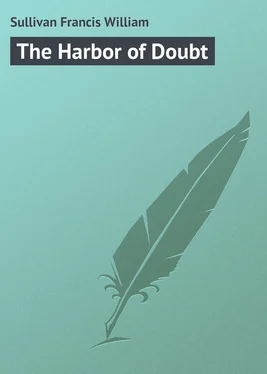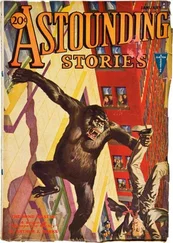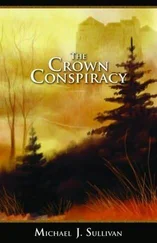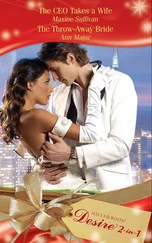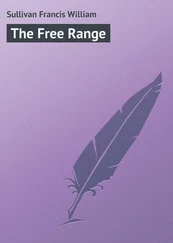Francis Sullivan - The Harbor of Doubt
Здесь есть возможность читать онлайн «Francis Sullivan - The Harbor of Doubt» — ознакомительный отрывок электронной книги совершенно бесплатно, а после прочтения отрывка купить полную версию. В некоторых случаях можно слушать аудио, скачать через торрент в формате fb2 и присутствует краткое содержание. Жанр: foreign_prose, на английском языке. Описание произведения, (предисловие) а так же отзывы посетителей доступны на портале библиотеки ЛибКат.
- Название:The Harbor of Doubt
- Автор:
- Жанр:
- Год:неизвестен
- ISBN:нет данных
- Рейтинг книги:5 / 5. Голосов: 1
-
Избранное:Добавить в избранное
- Отзывы:
-
Ваша оценка:
- 100
- 1
- 2
- 3
- 4
- 5
The Harbor of Doubt: краткое содержание, описание и аннотация
Предлагаем к чтению аннотацию, описание, краткое содержание или предисловие (зависит от того, что написал сам автор книги «The Harbor of Doubt»). Если вы не нашли необходимую информацию о книге — напишите в комментариях, мы постараемся отыскать её.
The Harbor of Doubt — читать онлайн ознакомительный отрывок
Ниже представлен текст книги, разбитый по страницам. Система сохранения места последней прочитанной страницы, позволяет с удобством читать онлайн бесплатно книгу «The Harbor of Doubt», без необходимости каждый раз заново искать на чём Вы остановились. Поставьте закладку, и сможете в любой момент перейти на страницу, на которой закончили чтение.
Интервал:
Закладка:
Bijonah Tanner remained silent for a moment, plainly embarrassed by the duty before him. Between most men who follow the sea and their daughters there is much less intimacy than with those who are in other walks of life. Long absences and the feeling that a mother is responsible for her girls are reasons for this; while in the case of boys, who begin to putter round the parental schooner from their earliest youth, a much closer feeling exists. Tanner could not bridge the chasm between himself and his daughter.
“Did you tell your mother?” he asked finally.
“Yes.”
“And was she satisfied?”
“Yes, indeed; she was very happy about it, and told me to come right down and tell you.”
“Wal, if it suits her it suits me,” was the dry conclusion. “I hope you’ll be happy. You’ve got a fine gal there, Nat.”
“I know I have, captain,” said Burns warmly; “and I’ll try to make her happy.”
“All right,” grunted Bijonah, and sank back into his chair. Between praising one man who saved his youngest boy, and congratulating another who was to marry his eldest girl, Captain Tanner’s day had been over full of ceremonial.
Face to face with the inevitable, Code Schofield offered sincere but embarrassed congratulations; and he was secretly glad that, when opportunity offered for him to shake Nat Burns’s hand, that young gentleman was busy lighting a cigarette.
The lovers went inside, and Code stood dejectedly, leaning against the railing. Tanner removed his pipe and spat over the railing.
“It’s too blamed bad!” he muttered.
“What?” asked Code, almost unconsciously.
“It’s too bad, I say. I used to think that mebbe Nellie would like you, Code. I’ve counted on it consid’able all my life. But it’s too late now. Young Burns’ll have to be one of the family from now on.”
“Thanks, captain,” said Schofield with forced cheerfulness. “I had hoped so, too. But that’s all past now. By the way, who was it you thought started all this trouble? I’d like to know that.”
“One of the family,” muttered Tanner, his thoughts still busy. Then, recollecting Schofield’s question, he appeared about to speak, hesitated, and at last said:
“Bless my soul and body if I know! No, I wouldn’t want to say what I thought, Code. I never was one to run down any man behind his back!”
Code looked in amazement at the old man, but not for long. A moment’s thought concerning Tanner’s recently acquired relation made his suspicion doubly sure that Nat Burns’s name had been on Bijonah’s tongue.
He immediately dropped the subject and after a little while took his departure.
CHAPTER VI
THE ISLAND DECIDES
In Freekirk Head, next morning, painted signs nailed to telegraph-poles at intervals along the King’s Road as far as Castalia read:
Who had issued this pronunciamento, what it signified, and what was the reason for a town meeting nobody knew; and as the men trudged down to their dories drawn up on the stony beach near the burned wharfs, discussion was intense.
Finally the fact became known that a half-dozen of the wealthiest and best-educated men in the village, including Squire Hardy and the Rev. Adelbert Bysshe, rector of the Church of England chapel, had held a secret conclave the night before at the squire’s house.
It was believed that the signs were the result, and intimated in certain obscure quarters that Pete Ellinwood, who had always claimed literary aspirations, had printed them.
Odd Fellows’ Hall was the biggest and most pretentious building in Freekirk Head. It was of two stories height, and on its gray-painted front bore the three great gilt links of the society. To one side of it stood a wreck of a former factory, and behind it was the tiny village “lockup.”
It marked the spot where the highway turned south at right angles on its wild journey southwest, a journey that ended in a leap into space from the three hundred foot cliffs of gull-haunted, perpendicular Southern Head.
The interior of the hall was in its gala attire. Two rows of huge oil-lamps extended down the middle from back to front; others were in brackets down the side walls, and three more above the low rostrum at the far end. The chairs were in place, the windows open, and the two young fishermen who acted as janitors of the hall stood at the rear, greeting those that arrived with familiar jocularity.
Into the hall, meant to accommodate two hundred, three hundred people were packed. The men in their rusty black, the women in their simple white or flowered dresses, the children brushed and pig-tailed, had all brought their Sunday manners and serious, attentive faces.
On the low platform presently appeared the Rev. Adelbert Bysshe and Squire Hardy. The rector was a young man with a thin, ascetic face. His mouth was pursed into a small line, and he wore large, round spectacles to aid his faded blue eyes. His clerical garb could not conceal the hesitating awkwardness of his manner, and the embarrassment his hands and feet caused him seemed to be his special cross in life.
When the audience had become quiet he rose and took his stand before them, lowering his head and peering over his glasses.
“Friends,” he said, “we have gathered here to-night to discuss the welfare of Grande Mignon Island and the village of Freekirk Head.”
A look of startled uncertainty swept over the simple, weather-beaten faces in front of him.
“You know that I am not exaggerating,” he continued, “when I say that we are face to face with the gravest problem that has ever confronted us. It has pleased God in His infinite Providence so to direct the finny tribes that the denizens of the deep have altered the location of their usual fishing-grounds.
“Day after day you men have gone forth with nets and lines like the fishers of old; day after day, also like some of the fishers of old, you have returned empty-handed. The salting-bins are not filled, the drying-frames are bare, the shipments to St. John’s have practically ceased.
“I do not need to tell you that this spells destitution. This island depends on its fish, and, since cod and hake and pollock have left us, we must cast about for other means of support.
“This meeting, then, after due deliberation last night and earnest supplication of the Almighty for guidance, has been called to determine what course we shall pursue.”
Mr. Bysshe, warm now and perspiring freely, retired to his seat and mopped his face. Across the audience, which had listened intently, there swept a murmur of low speech.
It is not given to most fisherfolk to know any more than the bare comforts of life. Theirs is an existence of ceaseless toiling, ceaseless danger, and very poor reward. Hardship is their daily lot, and it requires a great incentive to bring them to a full stop in consideration of their future.
Here, then, in Freekirk Head were three hundred fishermen with their backs against the wall–mutely brave because it is bred in the bone–quietly preparing for a final stand against their hereditary enemies, hunger and poverty.
The low murmur of awestruck conversation suddenly stopped, for Squire Hardy, with his fringe of white whiskers violently mussed, had risen to speak.
“Mr. Bysshe has just about got the lobster in the pot,” he declared, “but I want to say one thing more. Things were bad enough up to a week ago, but since the fire they have been a great deal worse. Mr. Nailor and Mr. Thomas, who owned the fish stand that burned, have been cleaned out. They gave employment to about twenty of you men.
“Those men are now without any work at all because the owners of the other fish stands have all the trawlers and dorymen they need. Even if they didn’t have, there are hardly enough fish to feed all hands on the island.
Читать дальшеИнтервал:
Закладка:
Похожие книги на «The Harbor of Doubt»
Представляем Вашему вниманию похожие книги на «The Harbor of Doubt» списком для выбора. Мы отобрали схожую по названию и смыслу литературу в надежде предоставить читателям больше вариантов отыскать новые, интересные, ещё непрочитанные произведения.
Обсуждение, отзывы о книге «The Harbor of Doubt» и просто собственные мнения читателей. Оставьте ваши комментарии, напишите, что Вы думаете о произведении, его смысле или главных героях. Укажите что конкретно понравилось, а что нет, и почему Вы так считаете.
